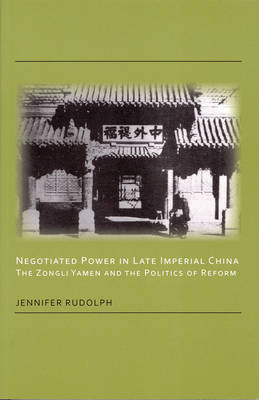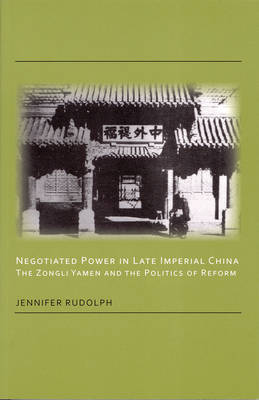
- Afhalen na 1 uur in een winkel met voorraad
- Gratis thuislevering in België vanaf € 30
- Ruim aanbod met 7 miljoen producten
- Afhalen na 1 uur in een winkel met voorraad
- Gratis thuislevering in België vanaf € 30
- Ruim aanbod met 7 miljoen producten
Zoeken
Negotiated Power in Late Imperial China
The Zongli Yamen and the Politics of Reform
Jennifer Rudolph
€ 42,45
+ 84 punten
Uitvoering
Omschrijving
Negotiated Power in Late Imperial China: The Zongli Yamen and the Politics of Reformexplores the nature and functioning of reform during the nineteenth century of China's Qing dynasty (1644-1911). By analyzing the bureaucratic modes of management that developed around the creation and evolution of the Zongli Yamen or Foreign Office (1861-1901), the book demonstrates the vitality of not only the Chinese State, but also the institutional traditions of its Manchu rulers. Drawing on precedent and the flexibility of the administrative system in their efforts to manage the conduct of foreign affairs, high Qing ministers transformed opportunities for institutional dynamism into the reality of a functioning central Zongli Yamen with a foreign affairs field administration supporting it in the provinces. In the process, they altered the governmental hierarchy and changed the definition of institutional power in the multi-faceted area of foreign affairs and, more generally, for the Qing bureaucracy. As the most significant example of institutional development in China's critical period of the nineteenth century, the Zongli Yamen's experience serves as valuable background for understanding reform efforts in late imperial China and beyond.
Specificaties
Betrokkenen
- Auteur(s):
- Uitgeverij:
Inhoud
- Aantal bladzijden:
- 246
- Taal:
- Engels
- Reeks:
Eigenschappen
- Productcode (EAN):
- 9781933947372
- Verschijningsdatum:
- 31/03/2010
- Uitvoering:
- Paperback
- Formaat:
- Trade paperback (VS)
- Afmetingen:
- 218 mm x 157 mm
- Gewicht:
- 272 g

Alleen bij Standaard Boekhandel
+ 84 punten op je klantenkaart van Standaard Boekhandel
Beoordelingen
We publiceren alleen reviews die voldoen aan de voorwaarden voor reviews. Bekijk onze voorwaarden voor reviews.











